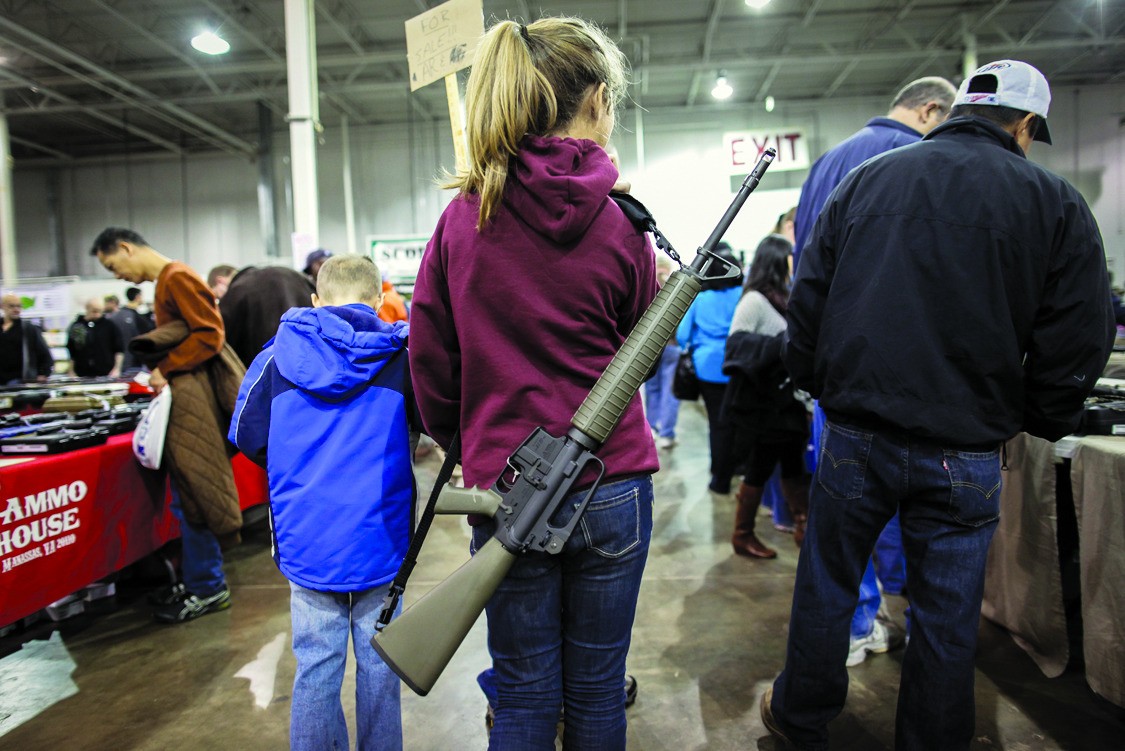A wave of counties and towns in Virginia are declaring themselves "sanctuaries" for the Second Amendment, but the resolutions are largely symbolic, legal experts say.
The push comes in anticipation of a Democrat-controlled General Assembly that will take office in January. State lawmakers, along with Gov. Ralph Northam, have promised Virginians a host of stricter gun laws as Democrats take full power in the state for the first time in decades.
More than 40 local governments have passed resolutions to protect citizens' Second Amendment rights against the potential laws they say are unconstitutional.
Gun safety advocates and some legal experts, however, call the resolutions "publicity stunts" that lack the force of law.
Here's what to know about Second Amendment sanctuaries:
Do Second Amendment sanctuary resolutions change the law?
"It's mostly a political statement," said Richard Schragger, a professor at the University of Virginia School of Law, who focuses on the intersection of the Constitution and local law.
Rather than challenging an existing statute, the resolutions are "mostly expressive and symbolic" declarations, he said.
"In Virginia, state law supersedes local law. Citizens and local officials have to comply with state law even if a county declares itself to be a Second Amendment sanctuary," Schragger added.
Dana Schrad, executive director of the Virginia Association of Chiefs of Police, said the resolutions are "meant to put political pressure on elected officials."
More on Second Amendment sanctuaries:NRA helps sheriffs fight gun laws in Second Amendment 'sanctuaries'
Before the election in Virginia, gun policy was the most important voting issue among both Democrats and Republicans, according to a Washington Post-George Mason University poll.
Democrats campaigned on a slew of possible new restrictions, including universal background checks for gun buyers, limits on the sale of certain types of firearms and a "red flag" law that would allow guns to be taken from a person deemed by a court to pose a danger to themselves or others.
After a mass shooting in May at a municipal building in Virginia Beach left 12 people dead, Northam called a special legislative session in July to consider many of the measures, but Republicans adjourned it, rejecting them all without a vote.
Northam said he will revisit the proposals in January.
Why do gun owners support sanctuaries?
Supporters of the sanctuary resolutions say they believe the proposed gun measures could infringe on their Second Amendment rights.
"It's taking a stand to protect your constitutional rights and sending a message to Richmond that we will not stand by and do nothing," said Pam Carter, a local official in Augusta County, where the board of supervisors approved a resolution to become a Second Amendment sanctuary earlier this month.
Joyce Malcolm, a professor of constitutional law and the Second Amendment at George Mason University, said some of the gun restriction proposals could be challenged in court.
"You ought not to have to abide by something that is blatantly unconstitutional," she said.
However, Schragger at UVA said similar regulations in other states have not been struck down as unconstitutional. "They are very standard and conventional gun regulations," he said.
Many of the sanctuary resolutions have featured similar language and come from organizations like the Virginia Citizens Defense League, a statewide group that supports rights to bear arms.
The group's president, Philip Van Cleave, told the Washington Post that his group drafted many of the counties' resolutions.
"I've never seen anything like this," he told the Post of the movement. "Everything has exploded right now. Gun owners are awake." Van Cleave did not respond to USA TODAY's requests for comment.
Will law enforcement ignore gun laws?
In general, the local resolutions do not compel law enforcement to ignore state law, rather to uphold the Second Amendment, said Schrad, with the state chiefs of police association.
"The resolutions don't have force of law," she said. "They are policy statements. They don't empower localities to turn a blind eye to what is state law."
Nick Suplina, managing director for law and policy at the anti-gun violence nonprofit Everytown for Gun Safety, said he does not know of an example where enforcement of a state law was refused in practice.
"Legally, public officials may risk official immunity if they are refusing to enforce an action required by law," he said.
In a statement to USA TODAY, Charlotte Gomer, press secretary for Virginia Attorney General Mark Herring, said his office expects all laws passed by the General Assembly will be followed.
"It's not clear ... what authority they think they have to preemptively opt-out of gun safety laws," she said.
Where else have Second Amendment sanctuaries been adopted?
Across the United States, dozens of counties and cities have adopted Second Amendment sanctuary resolutions. Virginia localities are among the latest in the broader push.
In Florida, three days after the deadly shooting at a Pensacola naval base Dec. 6, neighboring Santa Rosa County passed a resolution declaring the county a Second Amendment sanctuary.
How do these differ from sanctuary cities on immigration laws?
In immigration sanctuary cities and states, local officials say they won't comply with enforcement of immigration laws. The key difference is the laws in question are federal, says Schragger, whereas Second Amendment sanctuaries concern potential state laws.
"The federal government can't force local officials to turn people over to immigration officials in the course of their policing duties," he said. "In gun sanctuaries, that is not the case when the state is adopting laws that local officials are oath bound to enforce ... Local officials are enforcing state law all the time."
"In a commonwealth like Virginia, our officers of the law are sworn to uphold the Constitution and the laws of the commonwealth," said Schrad.
Contributing: Claire Mitzel, Staunton News Leader, in Stuarts Draft, Virginia; The Associated Press. Follow USA TODAY's Ryan Miller on Twitter @RyanW_Miller




































